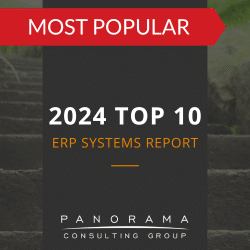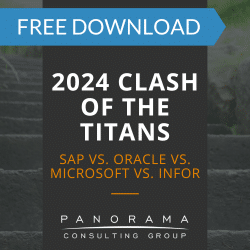The ERP software market has changed considerably over the last few years. So much so that many companies find themselves limited to a handful of systems to choose from – meaning that there is no need for an extensive software selection process and that the attention shifts from finding a “perfect system” to finding the best ERP system integrator.
There is merit to focusing more on the right ERP system integrator and less on overanalyzing ERP software options. For example, we are working with two global, multibillion-dollar companies that have narrowed their software search to SAP S4/HANA and Oracle Cloud. One isn’t a fan of Oracle, while the other has a bias against SAP, which leaves them each with one viable option.
Rather than considering the Tier II ERP space, which isn’t likely to fit their complex and global needs, both companies are instead focusing on finding the right system integrator. Sure, they could spend another several weeks or months analyzing these solutions to find the one that is the “most perfect” for their organization, but in both cases, they feel as though getting the groundwork started for a successful implementation is more important.
Not all SAP, Oracle or other SAP system integrators are created perfectly or equally. Some are more skilled than others. Some have global capabilities, while others have more of a personal touch. Some have great people, while others focus on building great methodologies. With so many to choose from, it is important to get this decision right.
Here are six tips to help choose the best ERP system integrator for your organization:
1. Define the Criteria Most Important to Your Organization
Every company has unique needs. Some need a global software partner with a deep bench of resources to support multiple countries. Others want a more boutique firm with specialized knowledge. Whatever the case, be sure to define, prioritize and evaluate the criteria most important to your organization.
2. Evaluate People, Resumes, Methodologies and Tools
It’s important to assess system integration firms from all angles. You will want to consider the people, their bios, experience and history. Be sure that the firm you are working with has the necessary tools and methodologies that can scale or be tailored to fit your needs. Companies frequently assess for bios and people, but they often forget to look at repeatable toolsets and methodologies to augment the skills of their people.
SAP vs. Oracle Case Study
SAP and Oracle both invest heavily in cloud technology. However, our client was skeptical about cloud scalability and unsure if the products were mature and proven.
3. Assess Understanding of Current Software Tools and Options
Every ERP implementation looks different, so it is likely that yours will be different as well. You will require modules, enhancements and integration points that fit your unique needs. It is important that your chosen system integrator has experience with a variety of deployment options. On one hand, you want to leverage their experience and knowledge to make recommendations, but you also want the comfort of knowing that the integrator has broad proven experience to help define the best approach for your organization.
4. Evaluate the Company’s Direct and Indirect Industry Knowledge
Industry experience and knowledge is important, as is cross-industry experience. You want to know that your integrator has experience with companies like yours (in your industry) to ensure that you don’t over-customize or miss ways to leverage their off-the-shelf technology to fit your business processes. In addition, you want to know that the integrator is capable of leveraging best practices from other industries to help your team think outside the box (for example: best practices from financial services firms to help a manufacturer better run its financial operations).
5. Do Not Forget About Cultural Fit
It is easy to get caught up in technical and functional capabilities while forgetting about what is arguably the most important thing, cultural fit. You need to know that your integrator’s people are going to fit in well with your team. They will need to understand your culture and operations and help you navigate the various complexities of an SAP, Oracle, Microsoft Dynamics, or ERP implementation with another solution. This is an intangible, yet a very important aspect of what will determine your project’s success or failure.
6. Explore all of Your Alternatives
You may believe that you are limited in which system integrators you can use, but this simply isn’t true. Your ERP software vendor may recommend one or a handful of alternatives, but keep in mind that they are biased in their recommendations. This has to do with which ones have reached the highest sales tiers – not necessarily which one is the best fit for your organization. There are hundreds of VARs, resellers and system integrators supporting each of the major systems, so it’s up to you to explore and research all your alternatives.
A best practice is to have experienced independent thinking on your bench; an outside entity that has your best interest in mind while viewing the situation through a fresh lens. CNN and Fox News can report on the same event but have very different narratives, so who is right? Panorama Consulting can help in an agnostic way. With an unbiased view comes a partner that has a variety of resources and experience with both implementation successes and dissecting ERP failures. Start here by checking out our “2017 Clash of the Titans” report.














